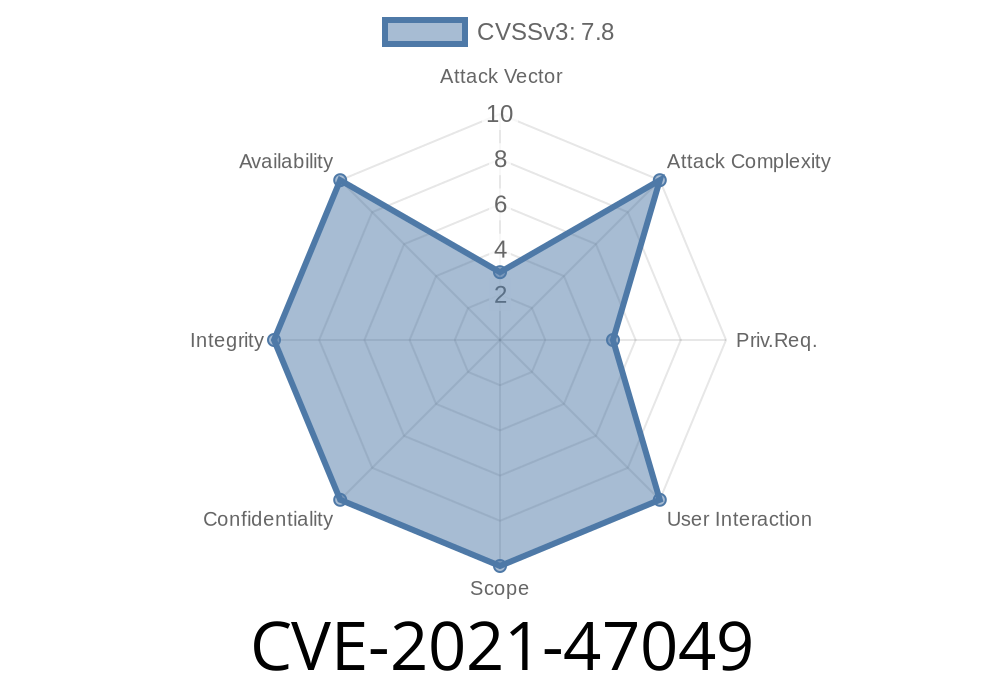In this post, we’ll break down a real-world Linux kernel vulnerability—CVE-2021-47049—that could compromise kernel stability and security. We’ll talk about what happened, how the bug was fixed, show code snippets, and provide guidance for anyone running affected systems.
What Is CVE-2021-47049?
CVE-2021-47049 is a use-after-free vulnerability in the Microsoft Hyper-V Virtual Machine Bus (VMBus) driver inside the Linux kernel. Discovered in the function __vmbus_open(), this bug could allow for memory corruption or potentially more severe exploitation in virtualized environments using Hyper-V.
The root issue: When handling an error, the code freed a data structure (open_info) before removing it from a list it belonged to. If later code accessed the same list, it might use the already-freed structure, possibly leading to crashes—or even malicious code execution if an attacker timed things just right.
The Technical Background
The VMBus driver facilitates communication between Linux virtual machines and Microsoft’s Hyper-V hypervisor. The bug happened within the function responsible for opening a channel to the host, in this way:
- The function allocated memory for a struct called open_info and added it to a linked list (the channel message list).
If there was an error, the code freed open_info but didn’t remove it from the list.
- After freeing, the list still included a pointer to freed memory—leading to use-after-free if accessed.
Here is a simplified version of the buggy C code (for illustration)
// Before the fix:
open_info = kmalloc(sizeof(*open_info), GFP_KERNEL);
list_add(&open_info->msg_list, &vmbus_connection.chn_msg_list);
if (error) {
kfree(open_info); // Memory is freed
// BUG: open_info->msg_list is still in the list!
return error;
}
After an error, open_info gets freed, but its msg_list node isn’t pulled from the chn_msg_list. If the list is processed later on, accessing open_info would be a use-after-free.
The Patch: How the Bug Was Fixed
The fix is simple and effective—remove open_info from the list *before* freeing it.
// After the fix:
if (!error) {
list_add(&open_info->msg_list, &vmbus_connection.chn_msg_list);
} else {
// error occurred, clean up safely
list_del(&open_info->msg_list); // Remove from list before free
kfree(open_info);
return error;
}
Key point: Always remove objects from lists before freeing them!
How Could This Be Exploited?
While this is not a "direct remote code execution" bug, use-after-free vulnerabilities can become dangerous if an attacker can:
Who Is Affected?
- Linux Kernel versions: The bug is present in kernels where the Hyper-V VMBus driver code did not yet have the fix. Check your distro’s kernel version and changelogs.
- Systems running as a Hyper-V VM: Bare metal Linux isn’t affected; only guests on Microsoft Hyper-V using the VMBus driver are at risk.
How to Protect Yourself
- Update your kernel: Install all security updates from your Linux distributor—most major platforms have already patched this issue (the fix landed May 2021).
- Minimize attack surface: If you don’t use Hyper-V integration, consider disabling the Hyper-V VMBus driver modules.
- Monitor security advisories: Always stay informed about kernel and virtualization stack CVEs relevant to your environment.
Learn More and Get the Patch
- Linux kernel commit with fix
- Official CVE entry: CVE-2021-47049
- LKML Patch Discussion
Summary
CVE-2021-47049 may look like a small coding mistake—but in kernel space, even little things are dangerous. If you use Linux virtual machines on Hyper-V, make sure your kernel has this fix to avoid possible stability and security risks. Always keep your systems patched and review changes in virtual machine integration components!
*Stay secure, and don’t let little bugs become big headaches!*
Timeline
Published on: 02/28/2024 09:15:40 UTC
Last modified on: 12/09/2024 19:06:07 UTC
